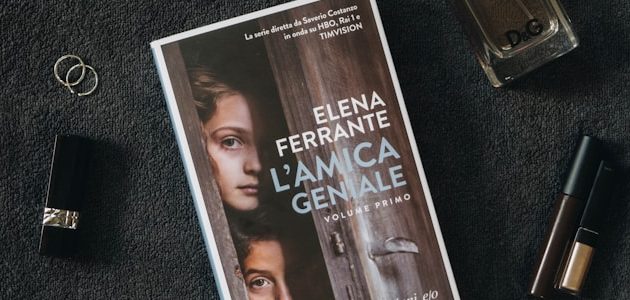Women of the World: Italian Powerhouse Elena Ferrante
When The New York Times released their top 100 books of the 21st century, it was no shock to me that Italian author Elena Ferrante topped that list. Her novel ‘My Brilliant Friend’, the first in her Neopolitan series, managed to beat out authors such as Stephen King or Hilary Mantel for the top spot. Ever since my mum recommended 16-year-old me to read ‘My Brilliant Friend’, Ferrante has truly been one of my favourite authors. However, the pseudonymous Italian author remains largely unheard of to the casual reader. So, what makes Ferrante so widely beloved by critics and authors alike, that she could beat out some of the largest names in the literary world, all while remaining anonymous?
Ferrante’s most celebrated work is undoubtedly her Neapoltian novels, and with good reason too. Starting with the aforementioned ‘My Brilliant Friend’, the quartet charts the lives of Elena and Lila, two friends growing up in Naples, Italy. Told through the perspective of Elena, the novels chart not only the lives of these two girls, but the development of Italian society from the 1950s onwards. A coming of age novel set against the backdrop of a country that is coming of age itself, the novel is nuanced in its approach towards class, gender and all the other politics of their changing lives. But what makes these novels so memorable, is Ferrante’s depiction of the two girls’ friendship. Lila is headstrong and stubborn, Elena the opposite, and the girl’s tumultuous relationship is often cited as one of the most accurate depictions of female friendship out there.
Her unique perspective and women-centred narratives are part of what makes Ferrante such a stand-out author
Her unique perspective and women-centred narratives are part of what makes Ferrante such a stand-out author. And her most recent novel, ‘The Lying Lives of Adults’, is no exception. It follows 12-year-old Giovanna, who, after hearing her father insult her appearance two years earlier, leaves home and undergoes a metamorphosis similar to that of Elena and Lila in her Neapolitan novels. Ferrante, once again, expertly depicts girlhood and growing up, in a way so nuanced and relatable to women everywhere.
‘The Days of Abandonment’, however, shifts away from Ferrante’s much loved coming-of-age genre. It tells the story of a woman’s descent into madness and depression, after her husband of fifteen years abruptly leaves her. The novel explores motherhood and mental health in a way that is both raw and unapologetic. What is so striking about Ferrante’s portrayal of women, is how unashamedly messy, unlikeable and real she allows these characters to be. ‘The Days of Abandonment’ also serves to prove Ferrante’s range as a writer, as its psychological exploration of madness starkly contrasts the tone of, for example, ‘My Brilliant Friend’.
Her novels have also been adapted into various series and TV shows. Most notably, Netflix’s adaptation of ‘The Lost Daughter’, starring Olivia Coleman and Dakota Johnson. Directed by Maggie Gyllenhal, the film was nominated for three Oscars in 2022, and maintains all the hallmarks of a Ferrante narrative. Coleman plays Leda, who, as in much of Ferrante’s work, plays the taboo role of an uncaring and ‘non-maternal’ mother. Ferrante’s narrative addresses ideas of motherhood, with both compassion and nuance, allowing her female characters to be three dimensional beings, rather than any kind of archetype.
No one knows for sure who Ferrante really is
Aside from her incredible writing skills and unique perspectives, the most intriguing thing about Ferrante is the author herself: Elena Ferrante is a pen name. No one knows for sure who Ferrante really is, but one journalist, Claudio Gatti, attempted to find out. In his article, ‘Elena Ferrante: An Answer?’ Gatti went to painstaking lengths to use forensic accounting in order to uncover a money trail which, he believes, leads right to the author herself. Gatti claims her anonymity is a ‘publicity play’, which, in some ways, is true. Ferrante’s anonymity adds to her universality – she writes for all women, about all women, we don’t need to know which specific woman she is. While Gatti’s article is an obvious invasion of privacy, most fans of Ferrante simply have no interest in it. As Alexandra Shwartz puts in her article ‘The ‘Unmasking’ of Elena Ferrante’, “To fall in love with a book, in that way that I and so many others have fallen in love with Ferrante’s, is to feel a special kinship with its author, a profound sort of mutual receptivity and comprehension”.
Elena Ferrante, despite the secrecy surrounding her, has managed to make a profound and lasting impact on the literary world. In 2016, she was one Time’s 100 Most Influential People, and her Neapolitan novels have received countless accolades. The endless praise she receives is no surprise, with her endlessly unique, beautifully complex and, above all, incredibly entertaining writing style. Her female-centred narratives speak to women and girls across the world, all whilst commenting explicitly on Italian cultural and political issues. If I had to recommend one Ferrante novel to read, I would have to recommend ‘My Brilliant Friend’. Whilst my personal favourite may be the finale ‘The Story of the Lost Child’, the series is one of the most beautiful reading experiences out there, allowing us to grow alongside Elena and Lila. Therefore, Elena Ferrante is my pick for an Italian author, as the literary world’s most underrated phenomenon, I can’t recommend her enough.

Comments